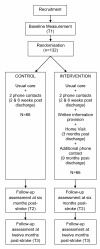From rehabilitation to recovery: protocol for a randomised controlled trial evaluating a goal-based intervention to reduce depression and facilitate participation post-stroke
- PMID: 21682910
- PMCID: PMC3135526
- DOI: 10.1186/1471-2377-11-73
From rehabilitation to recovery: protocol for a randomised controlled trial evaluating a goal-based intervention to reduce depression and facilitate participation post-stroke
Abstract
Background: There is much discourse in healthcare about the importance of client-centred rehabilitation, however in the realm of community-based therapy post-stroke there has been little investigation into the efficacy of goal-directed practice that reflects patients' valued activities. In addition, the effect of active involvement of carers in such a rehabilitation process and their subsequent contribution to functional and emotional recovery post-stroke is unclear. In community based rehabilitation, interventions based on patients' perceived needs may be more likely to alter such outcomes. In this paper, we describe the methodology of a randomised controlled trial of an integrated approach to facilitating patient goal achievement in the first year post-stroke. The effectiveness of this intervention in reducing the severity of post-stroke depression, improving participation status and health-related quality of life is examined. The impact on carers is also examined.
Methods/design: Patients (and their primary carers, if available) are randomly allocated to an intervention or control arm of the study. The intervention is multimodal and aims to screen for adverse stroke sequelae and address ways to enhance participation in patient-valued activities. Intervention methods include: telephone contacts, written information provision, home visitation, and contact with treating health professionals, with further relevant health service referrals as required. The control involves treatment as usual, as determined by inpatient and community rehabilitation treating teams. Formal blinded assessments are conducted at discharge from inpatient rehabilitation, and at six and twelve months post-stroke. The primary outcome is depression. Secondary outcome measures include participation and activity status, health-related quality of life, and self-efficacy.
Discussion: The results of this trial will assist with the development of a model for community-based rehabilitation management for stroke patients and their carers, with emphasis on goal-directed practice to enhance home and community participation status. Facilitation of participation in valued activities may be effective in reducing the incidence or severity of post-stroke depression, as well as enhancing the individual's perception of their health-related quality of life. The engagement of carers in the rehabilitation process will enable review of the influence of the broader social context on recovery.
Trial registration: Australia and New Zealand Clinical Trials Register (ANZCTR): ACTRN12608000042347.
Figures
References
-
- The National Stroke Foundation. Facts, figures, and statistics. http://www.strokefoundation.com.au
-
- Australian Institute of Health and Welfare. Australia's Health 2010. Canberra: Australian Institute of Health and Welfare; 2010.
Publication types
MeSH terms
LinkOut - more resources
Full Text Sources
Medical


